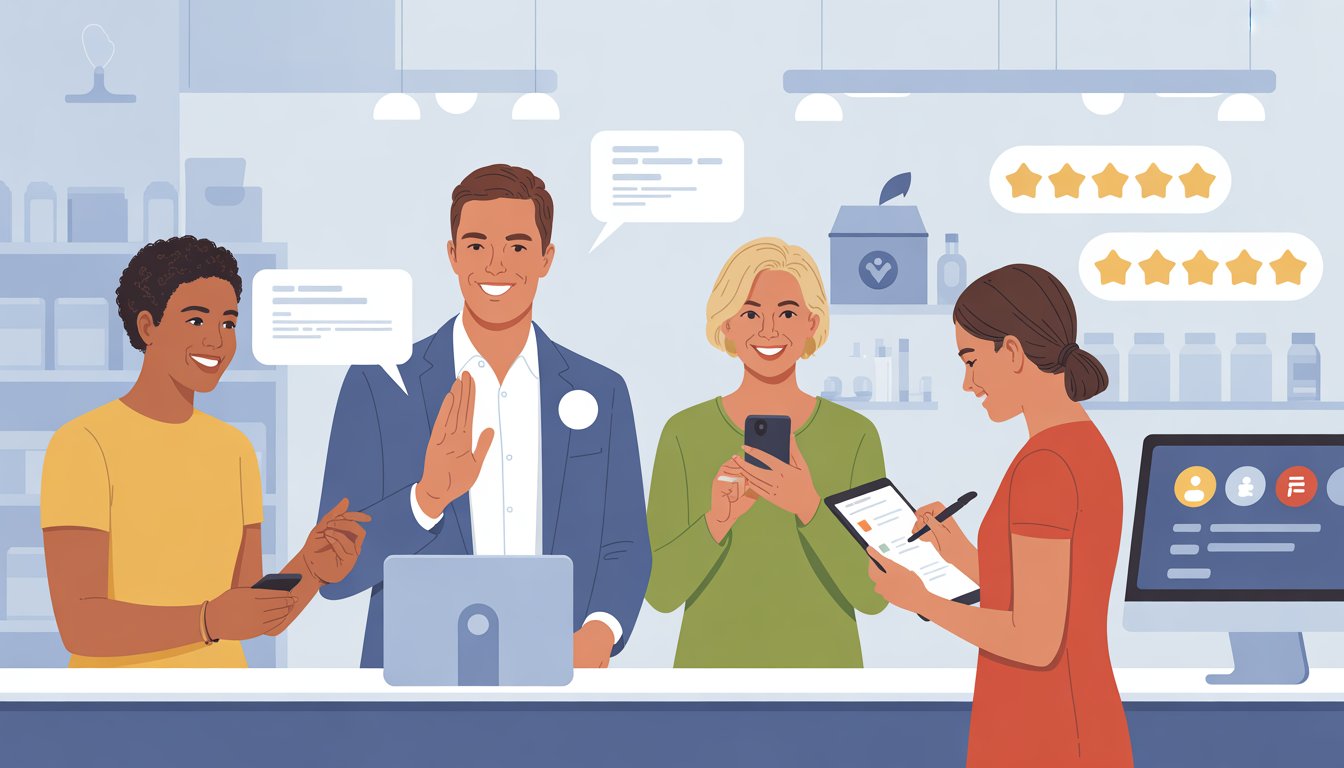When you see positive reviews rolling in for your business, you might wonder if it's worth your time to respond to each one.
Yes, you should respond to every positive review you receive.
This simple practice can significantly impact your business growth and customer relationships.

Responding to positive reviews does more than show good manners.
It builds stronger connections with your customers and demonstrates that you value their feedback.
Studies show that businesses responding to more than 25% of their reviews earn 35% more revenue on average.
Your positive review responses also work as powerful marketing tools.
They boost your online visibility, improve your search rankings, and show potential customers that you care about everyone who chooses your business.
Each response is a chance to reinforce your brand values and encourage future reviews.
Key Takeaways
- Responding to every positive review builds customer loyalty and can increase your revenue by up to 35%
- Review responses improve your online visibility and help with search engine rankings
- Each response is a marketing opportunity to showcase your brand values to potential customers
Why Responding to Every Positive Review Matters

Responding to positive reviews creates a direct connection with customers that drives satisfaction, strengthens relationships, and increases the likelihood they will return to your business.
Impact on Customer Satisfaction
When you respond to positive reviews, customers feel heard and valued.
This simple action shows that their opinion matters to you.
Customer satisfaction increases when people see their feedback acknowledged.
A quick "thank you" can make someone's day better.
Most customers don't expect responses to positive reviews.
When you do reply, it creates a pleasant surprise that boosts their overall experience with your brand.
This extra effort separates your business from competitors.
Many companies ignore positive feedback completely.
Research shows that customers who receive responses to their reviews rate their satisfaction 12% higher than those who don't get replies.
The act of responding makes customers feel like real people, not just numbers.
This personal touch improves how they view your entire company.
Building Strong Customer Relationships
Responding to positive reviews starts conversations with your customers.
These interactions create bonds that go beyond simple transactions.
Personal responses work best. Mention specific details from their review like the product they bought or service they used.
Each response is a chance to show your brand's personality.
Whether you're friendly, professional, or playful, consistency helps customers connect with your values.
These small interactions build trust over time.
Customers start to see your business as caring and attentive.
Long-term relationships form when customers feel appreciated.
They begin to think of your business as their preferred choice rather than just another option.
Social media amplifies this effect.
When others see you responding to reviews, they notice your commitment to customer care.
Boosting Customer Loyalty and Retention
Customers who receive responses to their positive reviews are 23% more likely to make repeat purchases within six months.
Acknowledgment creates emotional connections.
People want to support businesses that appreciate them.
Loyalty programs alone aren't enough. Personal responses to reviews create genuine feelings of appreciation that drive repeat business.
Responded-to customers also spend more money per transaction.
They feel comfortable investing in businesses that value their feedback.
These customers become brand advocates.
They tell friends and family about companies that take time to respond to reviews.
Word-of-mouth marketing from loyal customers is worth more than paid advertising.
One satisfied customer who feels appreciated can bring in several new customers through recommendations.
Regular engagement through review responses keeps your business top-of-mind when customers need your products or services again.
Benefits for Online Reputation and Local SEO

Responding to positive reviews creates measurable improvements in your online reputation while boosting your local search rankings.
Customer feedback engagement also drives more reviews from future customers.
Enhancing Your Online Reputation
Your online reputation improves when you respond to positive reviews.
This shows potential customers that you care about client satisfaction.
Research shows that 46% of local consumers consider whether businesses respond to reviews when making decisions.
This makes your response rate a key factor in how people view your business.
When you reply to positive reviews, you can highlight specific services or products mentioned.
This reinforces your strengths and shows you pay attention to details.
Your responses also let you showcase your brand personality.
You can use your unique voice to connect with customers in ways that basic review sites don't allow.
Responding creates more authentic relationships with customers.
It turns a simple review into a conversation that others can see and appreciate.
Improving Local Search Visibility
Google confirmed that responding to reviews impacts your local search rankings.
This means your responses can help more people find your business online.
Local SEO benefits include better visibility when people search for businesses like yours.
Search engines see review responses as fresh content that shows your business is active.
Your response rate matters for search rankings.
Businesses that respond to reviews regularly often rank higher than those that ignore customer feedback.
The timing of your responses also affects SEO.
Quick replies show search engines that your business is engaged and responsive to customers.
Each response adds more text content to your online presence.
This gives search engines more information about your business and services.
Encouraging More Customer Feedback
Customers are more likely to leave reviews when they see you respond to others.
This creates a positive cycle of customer feedback.
People feel valued when businesses take time to respond.
This encourages them to share their experiences and recommend you to others.
Your responses show future customers what kind of service they can expect.
When people see thoughtful replies, they trust that you will treat them well too.
Customer reviews increase when you actively engage with feedback.
Studies show that consumers are twice as likely to use businesses that respond to all reviews.
Responding also encourages customers to return and leave additional reviews after future visits.
This builds a stronger review profile over time.
Deciding When to Respond to Positive Reviews
Making smart choices about which positive reviews get your attention helps you use your time better while building strong customer relationships.
The key is finding the right balance between showing appreciation and managing your workload effectively.
Responding to All Reviews vs. Selective Replies
You face a choice between replying to every positive review or picking specific ones.
Both approaches have clear benefits and drawbacks.
Responding to all positive reviews shows you value every customer equally.
This builds trust and makes customers feel heard.
However, this takes a lot of time and resources, especially for busy businesses with many reviews.
Selective replies let you focus on the most important feedback first.
You can respond to reviews from:
- High-influence customers or influencers
- Detailed reviews that mention specific products or services
- Reviews on platforms where your target audience spends time
- First-time customers who might become loyal buyers
The selective approach works well when you have limited time.
You can still show appreciation while making your efforts count more.
Consider your business size and review volume.
Small businesses might reply to all reviews.
Larger companies often need to be more selective to stay efficient.
Assessing the Impact of Timely Responses
Fast responses to positive feedback create stronger connections with customers.
When you reply quickly, the customer still remembers their experience with your business.
Timing matters most for:
- Reviews from new customers
- Detailed reviews that show real engagement
- Reviews on platforms where conversations happen fast
Quick replies show you pay attention to customer feedback.
This makes customers more likely to return and recommend you to others.
Reviews that sit without responses for weeks lose their impact.
The customer may forget about your business entirely.
Set up alerts for new positive reviews so you can respond within 24-48 hours.
This keeps the conversation fresh and meaningful.
Some reviews need faster responses than others.
A detailed review from a new customer deserves quicker attention than a simple "great service" comment from a regular customer.
Balancing Efficiency with Personalization
You need to find the sweet spot between saving time and making customers feel special.
Generic responses feel robotic and waste the chance to build real relationships.
Efficient personalization strategies:
- Use the customer's name when possible
- Mention specific details they shared in their review
- Reference the product or service they used
- Keep a consistent brand voice across all responses
Create response templates for common situations, but always customize them.
A template saves time while personal touches show you care.
Avoid these common mistakes:
- Copy-pasting the exact same response
- Using overly formal language that doesn't match your brand
- Ignoring specific details the customer mentioned
Consider using tools that help you track and respond to reviews faster.
These tools can alert you to new positive feedback and help you organize your responses better.
The best approach combines speed with genuine appreciation.
Your customers should feel like real people responded, not a computer program.
Best Practices for Replying to Positive Reviews
When responding to 5-star reviews and positive feedback, focus on making each reply personal while maintaining consistent quality.
Quick responses with the right tone help build stronger customer relationships and showcase what makes your business special.
Personalized Replies vs. Templates
Templates save time but personalized responses create stronger connections.
You can use templates as starting points, then customize them for each customer.
Start with basic template structures like:
- Thank you + customer name
- Mention specific detail from their review
- Invite them back
Avoid copy-paste responses. Customers notice when replies look identical.
Change at least 2-3 elements in each response.
Add personal touches by:
- Using the reviewer's name
- Mentioning their specific experience
- Referencing details they shared
For example, instead of "Thank you for your review," try "Thanks Sarah for mentioning how much you loved our chocolate cake."
Mix templates with genuine personalization.
This approach lets you respond quickly while still making customers feel valued.
Referencing Specific Feedback
Quote or mention specific parts of their review.
This shows you actually read what they wrote instead of sending generic replies.
When customers mention your staff, acknowledge them: "We're so glad Maria provided excellent service during your visit."
Reference specific products or services they enjoyed: "It's wonderful that you loved our new lunch menu items."
Highlight details they shared about their experience.
If they mentioned fast delivery, thank them for noting your quick service.
This approach makes your positive review responses feel authentic.
It also reinforces the good things customers noticed about your business.
Timeliness and Tone in Responses
Reply within 1-3 days when possible.
Quick responses show you value customer feedback and stay engaged with your audience.
Keep your tone:
- Warm but professional
- Grateful without being overly emotional
- Consistent with your brand voice
Match the customer's energy level.
If they wrote an excited review, you can be more enthusiastic in your reply.
Use simple, friendly language.
Avoid business jargon that sounds stiff or robotic.
Thank them genuinely: "Your kind words mean so much to our team" works better than "We appreciate your feedback."
Showcasing Brand Strengths
Use positive review responses to highlight what makes your business special.
When customers praise your service, reinforce those strengths.
If they mention quality, respond with: "Quality is our top priority, so we're thrilled you noticed the difference."
Connect their feedback to your business values.
This helps other potential customers understand what you stand for.
Mention your team when appropriate: "Our staff works hard to create memorable experiences, so your review really motivates us."
Don't oversell in your replies.
Keep the focus on thanking the customer while subtly reinforcing your brand's best qualities.
Turn positive feedback into social proof.
Your professional responses show future customers how much you care about satisfaction.
How to Write Effective Positive Review Responses
Writing effective responses requires balancing genuine appreciation with your unique brand voice while addressing any improvement suggestions customers might share.
This approach creates stronger relationships and demonstrates your commitment to customer satisfaction.
Expressing Sincere Gratitude
Start every response with authentic appreciation.
Thank the customer by name when possible and mention specific details they shared in their review.
Poor example: "Thanks for the review!"
Better example: "Thank you, Sarah! We're thrilled you loved our quick delivery and helpful customer service team."
Address the effort customers took to write their feedback.
Many people skip leaving reviews, so acknowledge their time investment.
Use these gratitude phrases:
- "We appreciate you taking the time to share"
- "Thank you for choosing us"
- "Your feedback means so much to our team"
Avoid generic responses.
Each reply should feel personal and thoughtful.
Reference specific services, products, or experiences the customer mentioned.
Keep your gratitude brief but meaningful.
Two to three sentences expressing genuine thanks work better than lengthy paragraphs.
Incorporating Brand Personality
Your responses should reflect your company's unique voice and values. A casual restaurant might use friendly, relaxed language while a law firm should maintain a professional tone.
Casual brand example: "Hey Mike! We're so happy you enjoyed our new pizza recipe. Can't wait to see you back for taco Tuesday!"
Professional brand example: "Dear Mr. Johnson, we appreciate your confidence in our legal services and look forward to serving you again."
Match your review response tone to your other marketing materials. This consistency builds brand recognition and trust.
Consider these personality elements:
- Humor (if appropriate for your brand)
- Enthusiasm through exclamation points or positive words
- Formality level that matches your customer base
Share your company values when relevant. If a customer praises your eco-friendly practices, reinforce your environmental commitment in your response.
Addressing Constructive Feedback in Positive Reviews
Positive reviews often include mild suggestions or areas for improvement. Handle these comments with care and professionalism.
Acknowledge their constructive feedback directly: "Thanks for suggesting longer store hours - we're actually exploring that option!"
Never dismiss or ignore improvement suggestions. Even in positive reviews, customers provide valuable insights about your customer experience.
Turn feedback into action when possible:
- "We've shared your menu suggestions with our chef"
- "Your parking feedback is helping us plan our next location"
- "We're working on the checkout process improvements you mentioned"
Thank customers for both praise and suggestions. This shows you value their complete experience and input.
Keep your response balanced. Spend more time thanking them for positives while still addressing their suggestions respectfully.
Leveraging Positive Review Replies for Business Growth
Encouraging Repeat Business
Responding to positive reviews creates a direct path to repeat purchases. Customers who receive thoughtful replies are 23% more likely to buy again within six months.
Your response should reinforce the specific benefits customers praised. If they mentioned fast shipping, acknowledge your commitment to quick delivery.
Include subtle invitations for return visits. Simple phrases like "we look forward to serving you again" plant seeds for future business without being pushy.
Consider these proven tactics:
- Offer loyalty points or small discounts in your reply
- Mention new products similar to what they purchased
- Invite them to follow your social media for updates
Track which customers leave reviews and their subsequent purchase behavior. This customer feedback becomes valuable data for measuring the impact of your response strategy.
Nurturing Long-Term Engagement
Review replies build the foundation for ongoing customer relationships beyond single transactions. Engaged customers spend 60% more per purchase compared to one-time buyers.
Your responses show other potential customers how you treat people. Public replies demonstrate your commitment to customer satisfaction and create trust with prospects reading reviews.
Use replies to gather more customer feedback. Ask satisfied customers to share photos or suggest improvements.
Effective engagement strategies include:
- Asking customers to join your email list
- Inviting them to participate in product development surveys
- Encouraging user-generated content creation
- Offering exclusive access to new products
Personal touches matter most. Reference specific details from their review and use their name when possible.
This personal attention transforms satisfied customers into loyal advocates who recommend your business to others.
Frequently Asked Questions
Business owners often have specific questions about reply strategies and timing when managing positive customer feedback. These common concerns focus on best practices, business benefits, and practical response methods.
What are the best practices for replying to five-star reviews?
Respond within 48 hours to show you value customer feedback. Fast response times help build a stronger brand reputation.
Use the customer's name in your reply. This makes the response feel personal rather than generic.
Thank the customer for taking time to leave their review. Express genuine appreciation for their feedback.
Reference specific details from their review. This shows you actually read what they wrote.
Keep your response professional but friendly. Avoid overly promotional language that sounds like a sales pitch.
Encourage future engagement without being pushy. You can invite them to visit again or follow your social media.
How can responding to positive online reviews benefit a business?
Nine out of ten customers support businesses that respond to all reviews. This builds customer loyalty and trust.
Review responses help your search engine rankings. Google often shows businesses that actively engage with customers in search results.
Responding sets you apart from competitors who ignore customer feedback. It shows you care about customer satisfaction.
Public responses strengthen relationships with existing customers. They see that you value their opinions and experiences.
Future customers read your responses before making purchase decisions. Your replies influence how potential buyers view your business.
What are some examples of appropriate responses to positive feedback?
For product reviews, thank the customer by name and mention the specific product they praised. Express excitement that it met their needs.
For service reviews, acknowledge any employees mentioned by name. Share their praise with your team and thank the customer for their kind words.
For experience reviews, highlight the specific aspects they enjoyed. Thank them for choosing your business and mention your commitment to quality service.
For value reviews, acknowledge their satisfaction with pricing or promotions. Express your commitment to providing good value for customers.
For delivery reviews, celebrate the success with enthusiasm. Thank them for noting your shipping speed or packaging quality.
Is it necessary for a business owner to acknowledge every single positive review?
You should respond to every positive review you receive. This shows potential customers that you are present and care about customer experiences.
Responding to all reviews builds stronger customer relationships. It demonstrates that you value every customer's feedback equally.
Customers expect businesses to acknowledge their time and effort in writing reviews. Not responding can make them feel ignored.
Consistent responses help maintain your online reputation. They show you are actively managing your business and customer relationships.
How can I effectively respond to positive reviews to maintain customer engagement?
Personalize each response instead of using copy-and-paste replies. Customers can tell when responses are generic and automated.
Ask satisfied customers to share their experience with friends or on social media. This helps expand your customer base naturally.
Mention any improvements or changes based on customer feedback. This shows you listen and take action on suggestions.
Invite customers to connect with you through other channels. You can mention your newsletter, social media, or loyalty programs.
Use positive reviews as opportunities to highlight your business values. Share what makes your company special without being overly promotional.
What guidelines should I follow when crafting a reply to positive comments on my business?
Never get defensive, even with mixed reviews that have both positive and negative points. Address concerns constructively and professionally.
Avoid robotic or template responses that sound impersonal. Each customer's experience deserves a thoughtful, individual reply.
Don't overlook specific details customers mention in their reviews. Acknowledging their comments shows you read and value their feedback.
Keep promotional language to a minimum in your responses. Focus on gratitude and relationship building.
Maintain the same tone and voice across all responses. This creates a consistent brand experience for people reading your replies.










